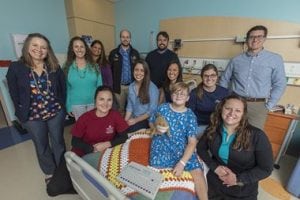All About Us is an initiative in collaboration with nurses and Child Life specialists. It will use grant money for games, toys and medical team baseball cards (used in place of business cards) that patients can collect from their doctors, nurses and Child Life specialists. They include fun facts on each caregiver, such as favorite foods, hobbies and trivia. In turn, patients are asked to design an “All About Us” poster for their room that offers their own personal facts, all of which can help start a great conversation and get everyone acquainted.
The program allows residents to sit with a patient, get to know him or her, play games and form a connection that builds trust and can improve care. “For instance,” Nghiem offers, “I had an infant who needed oxygen, but her mom threatened to leave against medical advice. We did not understand why until I sat down and talked to her one-on-one. It turned out she was concerned that she had run out of money for food. We were able to connect her with the appropriate resources so she could stay until her baby fully recovered without worrying about meeting her own needs.”
Little pieces of information can lead to solutions. “I ran into a mom in our General Pediatrics Clinic recently,” she adds. “I had taken care of her baby since she was born, but it was only through this conversation months later that I learned that every time they came to our clinic for care, they had to walk. Once I realized that, I was able to arrange for some bus passes for her.”
The residents are thrilled about the opportunities All About Us will provide to help patients.
“I’ve already been able to get back to bedside a few times and those are the days I leave the hospital in the best mood,” says an enthusiastic Alana Koehler, M.D. “Not only does it help me feel more fulfilled, I am able to provide better patient care because I’m getting to know the kids and families as individuals rather than a diagnosis or problems list. It’s a great program.”
Nghiem agrees. “It’s really a win-win for the patient and the resident to have that hour to focus on patients who have needs and fears. It helps to put everything back into perspective, even for a brief moment. It’s a practice we hope the residents will then carry with them throughout their medical careers.”
The long-term goal is to disseminate this to other inpatient teams and eventually across the entire hospital once residents have tried it out. The Office of Medical Education as well as the inpatient hospitalist faculty will be providing resources and mentorship throughout the grant process.
Nghiem is excited to have selected an innovative residency program like the one that Johns Hopkins All Children’s offers, allowing her to explore ideas and find solutions that improve care for patients and work experiences for her fellow residents. “This hospital is pretty special,” she says. “I felt very supported in pursuing this idea, and I can’t wait to get it fully implemented.”
After all, there are resident baseball cards to start trading.